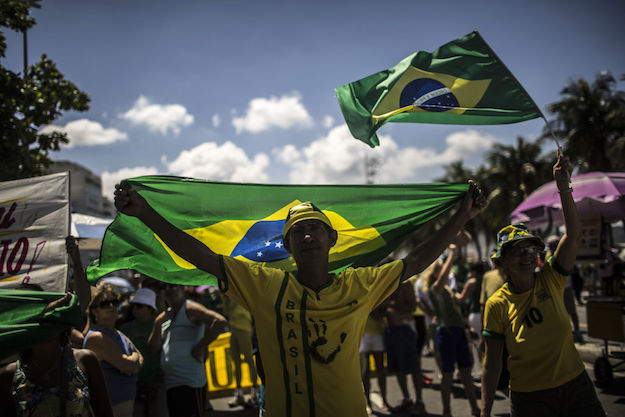Brazil has experienced almost non-stop political and economic turbulence since 2013, but the past few weeks have been particularly rough. A recent truckers’ strike is expected to shave off between 0.3 and 1 percent of already fragile GDP growth; a lack of much-needed reforms and continued policy volatility (including a 180-degree shift on fuel subsidies) suggest that Brazil’s economy may soon flirt with recession again. And while the economic data is bad – several million Brazilians have moved back into poverty in recent years – the political scenario seems, at first glance, even more depressing.
The recent strikes, which led to product shortages for a few days around the country, hit a raw nerve for a population tired of politics-as-usual. They also revealed a worrying vulnerability to radical solutions, like voting for the far-right former military officer Jair Bolsonaro, or asking for the armed forces to step in and restore order. Bolsonaro is leading in polls ahead of Brazil’s October presidential elections not because voters agree with his policies, but because they have lost hope in more moderate, traditional candidates. In the same way, scattered calls for military intervention on social media and by some of the striking truckers are not a sign of a desire for actual military rule, but of the belief that multiparty democracy cannot address Brazil’s many challenges. Former President Fernando Henrique Cardoso recently said “revolutionary conditions” were building up and warned Brazilians not to embrace “false prophets and demagogues.” In his recent column, AQ Editor-in-Chief Brian Winter described Brazil as “scared and leaderless.”
But while many current trends are indeed worrisome, and some parallels exist to pre-Chávez Venezuela or pre-Berlusconi Italy, the full-blown pessimism prevalent at most policy debates these days overlooks the many reasons to be optimistic about Brazil. Part of the reason is that unambiguous narratives are always tempting. A mere decade ago, Brazil offered a positive story that was so irresistible that few wanted to spoil the party and point out the country’s numerous problems: ill-conceived industrial policies, stubbornly rising levels of violence, the need for tax and pension reform, and endemic corruption. Fast-forward 10 years, and Brazil is seen as a basket case headed for disaster. Despair in recent weeks was so rampant that many people, even serious commentators, compared temporary shortages in Brazil to those in Venezuela – a comparison that was absurd, misleading and an affront to the unspeakable suffering of millions of Venezuelans.
It may not be a popular thing to say these days, but anybody who would return to Brazil after a decade-long absence would immediately notice progress on many fronts.
First of all, the Lava Jato investigation, while far from perfect, has upended centuries of impunity of the powerful and helped Brazilians learn about how corruption is the life-blood of “presidential coalitionism,” which forces minority presidents to engage in unhealthy collusion with the legislature, providing patronage and public sector jobs to small parties hungry for booty. While voters are right to feel that such a system does not serve their interests, understanding the problem is the first step to fixing it. Without this broad comprehension that Brazil’s political system is flawed, there can be no meaningful reform to boost transparency and accountability. Anybody predicting such massive progress back in 2010 would have been seen as overly optimistic.
Though painful and temporarily destabilizing, these revelations provide citizens and policymakers with a better roadmap of how to fix Brazil’s structural problems. Due to peculiar electoral rules, legislators do not enact sensible policies because they are not accountable to their voters, but to special interests. The political elites still enjoy indefensible legal privileges, political campaigns are too expensive and government contracts still too opaque. Changing these four conditions would transform the political process and facilitate a debate about how to address the reasons for economic malaise – low productivity due to insufficient investment in education and infrastructure, an excessive bureaucracy, and harmful economic policies protecting well-organized interest groups.
Finally, Brazilian society, particularly younger generations, are now more politically engaged and aware than at any other point in history. That will ultimately strengthen democracy. Despite previous cases of graft, political protest used to be so rare in Brazil that, when protesters in India took the streets to demonstrate against corruption in 2011, I spent most of the semester debating with my students about why young Brazilians were so disengaged. At the beginning of every undergraduate seminar I have taught over the past 10 years, my first question has always been the same: Who wants to run for public office? While 10 years ago raising a hand would have led to social ostracism, today countless students are politically engaged, frequently join street protests, fight for social causes like LGBTQ+ rights, and are planning to run for office or have worked for political campaigns. Vibrant debates about women’s rights, racism and corruption are now far more frequent and widespread on campus than ever before. Brazil is today one of the most impressive laboratories of political activism, sparking initiatives that use artificial intelligence to track public spending, apps that help citizens propose legislation, and organizations that work to attract talent to the public sector. Assuring that Brazil’s out-of-step political class catches up with the population is a monumental task – but if anybody can pull it off, it is Brazil’s highly politicized and engaged youth. If Bolsonaro wins, their resistance to any authoritarian tendencies will be fierce.
None of this is to say that overcoming Brazil’s mess will be easy. Conservative forces are still powerful, and the coming election could prove to be a setback – but there are equally powerful opportunities for progress. All the bad news currently dominating the public debate should not lead us to forget the many reasons to be hopeful about Brazil.








